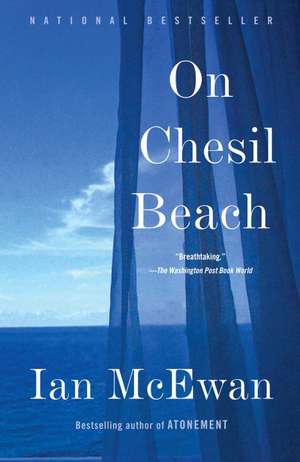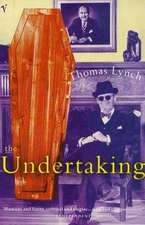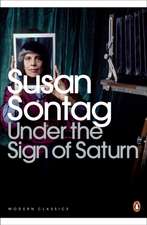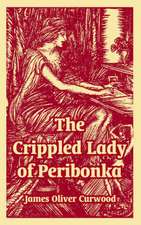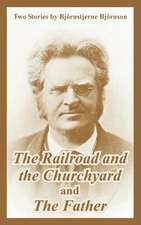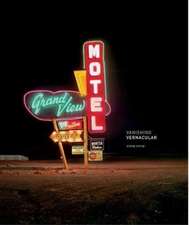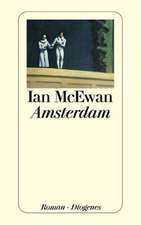On Chesil Beach
Autor Ian McEwanen Limba Engleză Paperback – 31 mai 2008
Vezi toate premiile Carte premiată
Man Booker Prize (2007), ALA Notable Books (2008)
| Toate formatele și edițiile | Preț | Express |
|---|---|---|
| Paperback (3) | 51.91 lei 24-35 zile | +16.98 lei 4-10 zile |
| Random House – 3 mai 2018 | 51.91 lei 24-35 zile | +16.98 lei 4-10 zile |
| Random House – 3 ian 2008 | 52.02 lei 24-35 zile | +17.19 lei 4-10 zile |
| Anchor Books – 31 mai 2008 | 93.00 lei 3-5 săpt. |
Preț: 93.00 lei
Nou
Puncte Express: 140
Preț estimativ în valută:
17.80€ • 19.34$ • 14.96£
17.80€ • 19.34$ • 14.96£
Carte disponibilă
Livrare economică 01-15 aprilie
Preluare comenzi: 021 569.72.76
Specificații
ISBN-13: 9780307386175
ISBN-10: 0307386171
Pagini: 203
Dimensiuni: 138 x 204 x 18 mm
Greutate: 0.23 kg
Editura: Anchor Books
ISBN-10: 0307386171
Pagini: 203
Dimensiuni: 138 x 204 x 18 mm
Greutate: 0.23 kg
Editura: Anchor Books
Notă biografică
IAN MCEWAN is the critically acclaimed author of seventeen novels and two short story collections. His first published work, a collection of short stories, First Love, Last Rites, won the Somerset Maugham Award. His novels include The Child in Time, which won the 1987 Whitbread Novel of the Year Award; The Cement Garden; Enduring Love; Amsterdam, which won the 1998 Booker Prize; Atonement; Saturday; On Chesil Beach; Solar; Sweet Tooth; The Children Act; Nutshell; and Machines Like Me, which was a number-one bestseller. Atonement, Enduring Love, The Children Act and On Chesil Beach have all been adapted for the big screen.
Extras
ONE
They were young, educated, and both virgins on this, their wedding night, and they lived in a time when a conversation about sexual difficulties was plainly impossible. But it is never easy. They had just sat down to supper in a tiny sitting room on the first floor of a Georgian inn. In the next room, visible through the open door, was a four–poster bed, rather narrow, whose bedcover was pure white and stretched startlingly smooth, as though by no human hand. Edward did not mention that he had never stayed in a hotel before, whereas Florence, after many trips as a child with her father, was an old hand. Superficially, they were in fine spirits. Their wedding, at St. Mary’s, Oxford, had gone well; the service was decorous, the reception jolly, the send–off from school and college friends raucous and uplifting. Her parents had not condescended to his, as they had feared, and his mother had not significantly misbehaved, or completely forgotten the purpose of the occasion. The couple had driven away in a small car belonging to Florence’s mother and arrived in the early evening at their hotel on the Dorset coast in weather that was not perfect for mid–July or the circumstances, but entirely adequate: it was not raining, but nor was it quite warm enough, according to Florence, to eat outside on the terrace as they had hoped. Edward thought it was, but, polite to a fault, he would not think of contradicting her on such an evening.
So they were eating in their rooms before the partially open French windows that gave onto a balcony and a view of a portion of the English Channel, and Chesil Beach with its infinite shingle. Two youths in dinner jackets served them from a trolley parked outside in the corridor, and their comings and goings through what was generally known as the honeymoon suite made the waxed oak boards squeak comically against the silence. Proud and protective, the young man watched closely for any gesture or expression that might have seemed satirical. He could not have tolerated any sniggering. But these lads from a nearby village went about their business with bowed backs and closed faces, and their manner was tentative, their hands shook as they set items down on the starched linen tablecloth. They were nervous too.
This was not a good moment in the history of English cuisine, but no one much minded at the time, except visitors from abroad. The formal meal began, as so many did then, with a slice of melon decorated by a single glazed cherry. Out in the corridor, in silver dishes on candle–heated plate warmers, waited slices of long–ago roasted beef in a thickened gravy, soft boiled vegetables, and potatoes of a bluish hue. The wine was from France, though no particular region was mentioned on the label, which was embellished with a solitary darting swallow. It would not have crossed Edward’s mind to have ordered a red.
Desperate for the waiters to leave, he and Florence turned in their chairs to consider the view of a broad mossy lawn, and beyond, a tangle of flowering shrubs and trees clinging to a steep bank that descended to a lane that led to the beach. They could see the beginnings of a footpath, dropping by muddy steps, a way lined by weeds of extravagant size—giant rhubarb and cabbages they looked like, with swollen stalks more than six feet tall, bending under the weight of dark, thick–veined leaves. The garden vegetation rose up, sensuous and tropical in its profusion, an effect heightened by the gray, soft light and a delicate mist drifting in from the sea, whose steady motion of advance and withdrawal made sounds of gentle thunder, then sudden hissing against the pebbles. Their plan was to change into rough shoes after supper and walk on the shingle between the sea and the lagoon known as the fleet, and if they had not finished the wine, they would take that along, and swig from the bottle like gentlemen of the road.
And they had so many plans, giddy plans, heaped up before them in the misty future, as richly tangled as the summer flora of the Dorset coast, and as beautiful. Where and how they would live, who their close friends would be, his job with her father’s firm, her musical career and what to do with the money her father had given her, and how they would not be like other people, at least, not inwardly. This was still the era—it would end later in that famous decade—when to be young was a social encumbrance, a mark of irrelevance, a faintly embarrassing condition for which marriage was the beginning of a cure. Almost strangers, they stood, strangely together, on a new pinnacle of existence, gleeful that their new status promised to promote them out of their endless youth—Edward and Florence, free at last! One of their favorite topics was their childhoods, not so much the pleasures as the fog of comical misconceptions from which they had emerged, and the various parental errors and outdated practices they could now forgive.
From these new heights they could see clearly, but they could not describe to each other certain contradictory feelings: they separately worried about the moment, sometime soon after dinner, when their new maturity would be tested, when they would lie down together on the four–poster bed and reveal themselves fully to each other. For over a year, Edward had been mesmerized by the prospect that on the evening of a given date in July the most sensitive portion of himself would reside, however briefly, within a naturally formed cavity inside this cheerful, pretty, formidably intelligent woman. How this was to be achieved without absurdity, or disappointment, troubled him. His specific worry, based on one unfortunate experience, was of overexcitement, of what he had heard someone describe as “arriving too soon.” The matter was rarely out of his thoughts, but though his fear of failure was great, his eagerness—for rapture, for resolution—was far greater.
Florence’s anxieties were more serious, and there were moments during the journey from Oxford when she thought she was about to draw on all her courage to speak her mind. But what troubled her was unutterable, and she could barely frame it for herself. Where he merely suffered conventional first-night nerves, she experienced a visceral dread, a helpless disgust as palpable as seasickness. For much of the time, through all the months of merry wedding preparation, she managed to ignore this stain on her happiness, but whenever her thoughts turned toward a close embrace—she preferred no other term—her stomach tightened dryly, she was nauseous at the back of her throat. In a modern, forward–looking handbook that was supposed to be helpful to young brides, with its cheery tones and exclamation marks and numbered illustrations, she came across certain phrases or words that almost made her gag: mucous membrane, and the sinister and glistening glans. Other phrases offended her intelligence, particularly those concerning entrances: Not long before he enters her…or, now at last he enters her, and, happily, soon after he has entered her…Was she obliged on the night to transform herself for Edward into a kind of portal or drawing room through which he might process? Almost as frequent was a word that suggested to her nothing but pain, flesh parted before a knife: penetration.
In optimistic moments she tried to convince herself that she suffered no more than a heightened form of squeamishness, which was bound to pass. Certainly, the thought of Edward's testicles, pendulous below his engorged penis—another horrifying term—had the potency to make her upper lip curl, and the idea of herself being touched “down there” by someone else, even someone she loved, was as repulsive as, say, a surgical procedure on her eye. But her squeamishness did not extend to babies. She liked them; she had looked after her cousin’'s little boys on occasion and enjoyed herself. She thought she would love being pregnant by Edward, and in the abstract, at least, she had no fears about childbirth. If only she could, like the mother of Jesus, arrive at that swollen state by magic.
Florence suspected that there was something profoundly wrong with her, that she had always been different, and that at last she was about to be exposed. Her problem, she thought, was greater, deeper, than straightforward physical disgust; her whole being was in revolt against a prospect of entanglement and flesh; her composure and essential happiness were about to be violated. She simply did not want to be “entered” or “penetrated.” Sex with Edward could not be the summation of her joy, but was the price she must pay for it.
She knew she should have spoken up long ago, as soon as he proposed, long before the visit to the sincere and soft–voiced vicar, and dinners with their respective parents, before the wedding guests were invited, the gift list devised and lodged with a department store, and the marquee and photographer hired, and all the other irreversible arrangements. But what could she have said, what possible terms could she have used when she could not have named the matter to herself? And she loved Edward, not with the hot, moist passion she had read about, but warmly, deeply, sometimes like a daughter, sometimes almost maternally. She loved cuddling him, and having his enormous arm around her shoulders, and being kissed by him, though she disliked his tongue in her mouth and had wordlessly made this clear. She thought he was original, unlike anyone she had ever met. He always had a paperback book, usually history, in his jacket pocket in case he found himself in a queue or a waiting room. He marked what he read with a pencil stub. He was virtually the only man Florence had met who did not smoke. None of his socks matched. He had only one tie, narrow, knitted, dark blue, which he wore nearly all the time with a white shirt. She adored his curious mind, his mild country accent, the huge strength in his hands, the unpredictable swerves and drifts of his conversation, his kindness to her, and the way his soft brown eyes, resting on her when she spoke, made her feel enveloped in a friendly cloud of love. At the age of twenty–two, she had no doubt that she wanted to spend the rest of her life with Edward Mayhew. How could she have dared risk losing him?
There was no one she could have talked to. Ruth, her sister, was too young, and her mother, perfectly wonderful in her way, was too intellectual, too brittle, an old–fashioned bluestocking. Whenever she confronted an intimate problem, she tended to adopt the public manner of the lecture hall, and use longer and longer words, and make references to books she thought everyone should have read. Only when the matter was safely bundled up in this way might she sometimes relax into kindliness, though that was rare, and even then you had no idea what advice you were receiving. Florence had some terrific friends from school and music college who posed the opposite problem: they adored intimate talk and reveled in each other’s problems. They all knew each other, and were too eager with their phone calls and letters. She could not trust them with a secret, nor did she blame them, for she was part of the group. She would not have trusted herself. She was alone with a problem she did not know how to begin to address, and all she had in the way of wisdom was her paperback guide. On its garish red covers were portrayed two smiling bug–eyed matchstick figures holding hands, drawn clumsily in white chalk, as though by an innocent child.
***
They ate the melon in less than two minutes while the lads, instead of waiting out in the corridor, stood well back, near the door, fingering their bow ties and tight collars and fiddling with their cuffs. Their blank expressions did not change as they observed Edward offer Florence, with an ironic flourish, his glazed cherry. Playfully, she sucked it from his fingers and held his gaze as she deliberately chewed, letting him see her tongue, conscious that in flirting with him like this she would be making matters worse for herself. She should not start what she could not sustain, but pleasing him in any way she could was helpful: it made her feel less than entirely useless. If only eating a sticky cherry was all that was required.
To show that he was not troubled by the presence of the waiters, though he longed for them to leave, Edward smiled as he sat back with his wine and called over his shoulder, “Any more of those things?”
“Ain’t none, sir. Sorry sir.”
But the hand that held the wineglass trembled as he struggled to contain his sudden happiness, his exaltation. She appeared to glow before him, and she was lovely—beautiful, sensuous, gifted, good–natured beyond belief.
The boy who had spoken nipped forward to clear away. His colleague was just outside the room, transferring the second course, the roast, to their plates. It was not possible to wheel the trolley into the honeymoon suite for the proper silver service on account of a two–step difference in level between it and the corridor, a consequence of poor planning when the Elizabethan farmhouse was “Georgianized” in the mid–eighteenth century.
The couple were briefly alone, though they heard the scrape of spoons over dishes, and the lads murmuring by the open door. Edward laid his hand over Florence's and said, for the hundredth time that day, in a whisper, “I love you,” and she said it straight back, and she truly meant it.
Edward had a degree, a first in history from University College, London. In three short years he studied wars, rebellions, famines, pestilences, the rise and collapse of empires, revolutions that consumed their children, agricultural hardship, industrial squalor, the cruelty of ruling elites—a colorful pageant of oppression, misery and failed hopes. He understood how constrained and meager lives could be, generation after generation. In the grand view of things, these peaceful, prosperous times England was experiencing now were rare, and within them his and Florence’s joy was exceptional, even unique. In his final year he had made a special study of the “great man” theory of history—was it really outmoded to believe that forceful individuals could shape national destiny? Certainly his tutor thought so: in his view History, properly capitalized, was driven forward by ineluctable forces toward inevitable, necessary ends, and soon the subject would be understood as a science. But the lives Edward examined in detail—Caesar, Charlemagne, Frederick the Second, Catherine the Great, Nelson and Napoleon (Stalin he dropped, at his tutor’s insistence)—rather suggested the contrary. A ruthless personality, naked opportunism and luck, Edward had argued, could divert the fates of millions, a wayward conclusion that earned him a B minus, almost imperiling his first.
From the Hardcover edition.
They were young, educated, and both virgins on this, their wedding night, and they lived in a time when a conversation about sexual difficulties was plainly impossible. But it is never easy. They had just sat down to supper in a tiny sitting room on the first floor of a Georgian inn. In the next room, visible through the open door, was a four–poster bed, rather narrow, whose bedcover was pure white and stretched startlingly smooth, as though by no human hand. Edward did not mention that he had never stayed in a hotel before, whereas Florence, after many trips as a child with her father, was an old hand. Superficially, they were in fine spirits. Their wedding, at St. Mary’s, Oxford, had gone well; the service was decorous, the reception jolly, the send–off from school and college friends raucous and uplifting. Her parents had not condescended to his, as they had feared, and his mother had not significantly misbehaved, or completely forgotten the purpose of the occasion. The couple had driven away in a small car belonging to Florence’s mother and arrived in the early evening at their hotel on the Dorset coast in weather that was not perfect for mid–July or the circumstances, but entirely adequate: it was not raining, but nor was it quite warm enough, according to Florence, to eat outside on the terrace as they had hoped. Edward thought it was, but, polite to a fault, he would not think of contradicting her on such an evening.
So they were eating in their rooms before the partially open French windows that gave onto a balcony and a view of a portion of the English Channel, and Chesil Beach with its infinite shingle. Two youths in dinner jackets served them from a trolley parked outside in the corridor, and their comings and goings through what was generally known as the honeymoon suite made the waxed oak boards squeak comically against the silence. Proud and protective, the young man watched closely for any gesture or expression that might have seemed satirical. He could not have tolerated any sniggering. But these lads from a nearby village went about their business with bowed backs and closed faces, and their manner was tentative, their hands shook as they set items down on the starched linen tablecloth. They were nervous too.
This was not a good moment in the history of English cuisine, but no one much minded at the time, except visitors from abroad. The formal meal began, as so many did then, with a slice of melon decorated by a single glazed cherry. Out in the corridor, in silver dishes on candle–heated plate warmers, waited slices of long–ago roasted beef in a thickened gravy, soft boiled vegetables, and potatoes of a bluish hue. The wine was from France, though no particular region was mentioned on the label, which was embellished with a solitary darting swallow. It would not have crossed Edward’s mind to have ordered a red.
Desperate for the waiters to leave, he and Florence turned in their chairs to consider the view of a broad mossy lawn, and beyond, a tangle of flowering shrubs and trees clinging to a steep bank that descended to a lane that led to the beach. They could see the beginnings of a footpath, dropping by muddy steps, a way lined by weeds of extravagant size—giant rhubarb and cabbages they looked like, with swollen stalks more than six feet tall, bending under the weight of dark, thick–veined leaves. The garden vegetation rose up, sensuous and tropical in its profusion, an effect heightened by the gray, soft light and a delicate mist drifting in from the sea, whose steady motion of advance and withdrawal made sounds of gentle thunder, then sudden hissing against the pebbles. Their plan was to change into rough shoes after supper and walk on the shingle between the sea and the lagoon known as the fleet, and if they had not finished the wine, they would take that along, and swig from the bottle like gentlemen of the road.
And they had so many plans, giddy plans, heaped up before them in the misty future, as richly tangled as the summer flora of the Dorset coast, and as beautiful. Where and how they would live, who their close friends would be, his job with her father’s firm, her musical career and what to do with the money her father had given her, and how they would not be like other people, at least, not inwardly. This was still the era—it would end later in that famous decade—when to be young was a social encumbrance, a mark of irrelevance, a faintly embarrassing condition for which marriage was the beginning of a cure. Almost strangers, they stood, strangely together, on a new pinnacle of existence, gleeful that their new status promised to promote them out of their endless youth—Edward and Florence, free at last! One of their favorite topics was their childhoods, not so much the pleasures as the fog of comical misconceptions from which they had emerged, and the various parental errors and outdated practices they could now forgive.
From these new heights they could see clearly, but they could not describe to each other certain contradictory feelings: they separately worried about the moment, sometime soon after dinner, when their new maturity would be tested, when they would lie down together on the four–poster bed and reveal themselves fully to each other. For over a year, Edward had been mesmerized by the prospect that on the evening of a given date in July the most sensitive portion of himself would reside, however briefly, within a naturally formed cavity inside this cheerful, pretty, formidably intelligent woman. How this was to be achieved without absurdity, or disappointment, troubled him. His specific worry, based on one unfortunate experience, was of overexcitement, of what he had heard someone describe as “arriving too soon.” The matter was rarely out of his thoughts, but though his fear of failure was great, his eagerness—for rapture, for resolution—was far greater.
Florence’s anxieties were more serious, and there were moments during the journey from Oxford when she thought she was about to draw on all her courage to speak her mind. But what troubled her was unutterable, and she could barely frame it for herself. Where he merely suffered conventional first-night nerves, she experienced a visceral dread, a helpless disgust as palpable as seasickness. For much of the time, through all the months of merry wedding preparation, she managed to ignore this stain on her happiness, but whenever her thoughts turned toward a close embrace—she preferred no other term—her stomach tightened dryly, she was nauseous at the back of her throat. In a modern, forward–looking handbook that was supposed to be helpful to young brides, with its cheery tones and exclamation marks and numbered illustrations, she came across certain phrases or words that almost made her gag: mucous membrane, and the sinister and glistening glans. Other phrases offended her intelligence, particularly those concerning entrances: Not long before he enters her…or, now at last he enters her, and, happily, soon after he has entered her…Was she obliged on the night to transform herself for Edward into a kind of portal or drawing room through which he might process? Almost as frequent was a word that suggested to her nothing but pain, flesh parted before a knife: penetration.
In optimistic moments she tried to convince herself that she suffered no more than a heightened form of squeamishness, which was bound to pass. Certainly, the thought of Edward's testicles, pendulous below his engorged penis—another horrifying term—had the potency to make her upper lip curl, and the idea of herself being touched “down there” by someone else, even someone she loved, was as repulsive as, say, a surgical procedure on her eye. But her squeamishness did not extend to babies. She liked them; she had looked after her cousin’'s little boys on occasion and enjoyed herself. She thought she would love being pregnant by Edward, and in the abstract, at least, she had no fears about childbirth. If only she could, like the mother of Jesus, arrive at that swollen state by magic.
Florence suspected that there was something profoundly wrong with her, that she had always been different, and that at last she was about to be exposed. Her problem, she thought, was greater, deeper, than straightforward physical disgust; her whole being was in revolt against a prospect of entanglement and flesh; her composure and essential happiness were about to be violated. She simply did not want to be “entered” or “penetrated.” Sex with Edward could not be the summation of her joy, but was the price she must pay for it.
She knew she should have spoken up long ago, as soon as he proposed, long before the visit to the sincere and soft–voiced vicar, and dinners with their respective parents, before the wedding guests were invited, the gift list devised and lodged with a department store, and the marquee and photographer hired, and all the other irreversible arrangements. But what could she have said, what possible terms could she have used when she could not have named the matter to herself? And she loved Edward, not with the hot, moist passion she had read about, but warmly, deeply, sometimes like a daughter, sometimes almost maternally. She loved cuddling him, and having his enormous arm around her shoulders, and being kissed by him, though she disliked his tongue in her mouth and had wordlessly made this clear. She thought he was original, unlike anyone she had ever met. He always had a paperback book, usually history, in his jacket pocket in case he found himself in a queue or a waiting room. He marked what he read with a pencil stub. He was virtually the only man Florence had met who did not smoke. None of his socks matched. He had only one tie, narrow, knitted, dark blue, which he wore nearly all the time with a white shirt. She adored his curious mind, his mild country accent, the huge strength in his hands, the unpredictable swerves and drifts of his conversation, his kindness to her, and the way his soft brown eyes, resting on her when she spoke, made her feel enveloped in a friendly cloud of love. At the age of twenty–two, she had no doubt that she wanted to spend the rest of her life with Edward Mayhew. How could she have dared risk losing him?
There was no one she could have talked to. Ruth, her sister, was too young, and her mother, perfectly wonderful in her way, was too intellectual, too brittle, an old–fashioned bluestocking. Whenever she confronted an intimate problem, she tended to adopt the public manner of the lecture hall, and use longer and longer words, and make references to books she thought everyone should have read. Only when the matter was safely bundled up in this way might she sometimes relax into kindliness, though that was rare, and even then you had no idea what advice you were receiving. Florence had some terrific friends from school and music college who posed the opposite problem: they adored intimate talk and reveled in each other’s problems. They all knew each other, and were too eager with their phone calls and letters. She could not trust them with a secret, nor did she blame them, for she was part of the group. She would not have trusted herself. She was alone with a problem she did not know how to begin to address, and all she had in the way of wisdom was her paperback guide. On its garish red covers were portrayed two smiling bug–eyed matchstick figures holding hands, drawn clumsily in white chalk, as though by an innocent child.
***
They ate the melon in less than two minutes while the lads, instead of waiting out in the corridor, stood well back, near the door, fingering their bow ties and tight collars and fiddling with their cuffs. Their blank expressions did not change as they observed Edward offer Florence, with an ironic flourish, his glazed cherry. Playfully, she sucked it from his fingers and held his gaze as she deliberately chewed, letting him see her tongue, conscious that in flirting with him like this she would be making matters worse for herself. She should not start what she could not sustain, but pleasing him in any way she could was helpful: it made her feel less than entirely useless. If only eating a sticky cherry was all that was required.
To show that he was not troubled by the presence of the waiters, though he longed for them to leave, Edward smiled as he sat back with his wine and called over his shoulder, “Any more of those things?”
“Ain’t none, sir. Sorry sir.”
But the hand that held the wineglass trembled as he struggled to contain his sudden happiness, his exaltation. She appeared to glow before him, and she was lovely—beautiful, sensuous, gifted, good–natured beyond belief.
The boy who had spoken nipped forward to clear away. His colleague was just outside the room, transferring the second course, the roast, to their plates. It was not possible to wheel the trolley into the honeymoon suite for the proper silver service on account of a two–step difference in level between it and the corridor, a consequence of poor planning when the Elizabethan farmhouse was “Georgianized” in the mid–eighteenth century.
The couple were briefly alone, though they heard the scrape of spoons over dishes, and the lads murmuring by the open door. Edward laid his hand over Florence's and said, for the hundredth time that day, in a whisper, “I love you,” and she said it straight back, and she truly meant it.
Edward had a degree, a first in history from University College, London. In three short years he studied wars, rebellions, famines, pestilences, the rise and collapse of empires, revolutions that consumed their children, agricultural hardship, industrial squalor, the cruelty of ruling elites—a colorful pageant of oppression, misery and failed hopes. He understood how constrained and meager lives could be, generation after generation. In the grand view of things, these peaceful, prosperous times England was experiencing now were rare, and within them his and Florence’s joy was exceptional, even unique. In his final year he had made a special study of the “great man” theory of history—was it really outmoded to believe that forceful individuals could shape national destiny? Certainly his tutor thought so: in his view History, properly capitalized, was driven forward by ineluctable forces toward inevitable, necessary ends, and soon the subject would be understood as a science. But the lives Edward examined in detail—Caesar, Charlemagne, Frederick the Second, Catherine the Great, Nelson and Napoleon (Stalin he dropped, at his tutor’s insistence)—rather suggested the contrary. A ruthless personality, naked opportunism and luck, Edward had argued, could divert the fates of millions, a wayward conclusion that earned him a B minus, almost imperiling his first.
From the Hardcover edition.
Recenzii
“Heartbreaking. . . . Breathtaking. . . . Masterly. . . . No one now writing in English surpasses or even matches McEwan's accomplishment.” —The Washington Post Book World“Remarkable, engaging, and gripping. . . . On Chesil Beach is not only a wonderful read but also perhaps that rarest of things: a perfect novel.” —San Francisco Chronicle“Dazzling. . . . McEwan treats [his subject] with a boundless sympathy, one that enlists the reader even as it disguises the fact that this seeming novel of manners is as fundamentally a horror novel as any [he's] written.” —Jonathan Lethem, The New York Times Book Review“A small, perfect, haunting work of art. . . . McEwan draws a humane, touching, sometimes comic portrait of marital misunderstanding in an era when so much less was sayable, or said.” —Los Angeles Times Book Review“Vintage McEwan. . . . His finely honed prose is a deep pleasure to experience.” —Chicago Sun-Times“Marvelously realized. . . .Wrenching, funny, smart, and hugely gratifying in unexpected ways. . . . On Chesil Beach is as merciful to its characters as it is merciless in its heartbreak.” —The Boston Globe“Exquisite. . . . compressed, crisp, [and] warmly specific. . . .[A] small masterpiece.” —Entertainment Weekly, “A”“Quietly riveting. . . . McEwan has never written more beautifully than he does in [this] melancholy and haunting new novel.” —O, The Oprah Magazine“A poignant meditation on love's ebb and flow.” —Vogue“A parable of failed empathy . . . mordant [and] melancholy.” —The Village Voice“Completely absorbing. . . . [I]nfused with a bitter poignancy…intense and powerful . . . a masterpiece.” —The Philadelphia Inquirer
Descriere
From the acclaimed author of "Atonement" comes a novel of remarkable depth and poignancy. Set in 1962, "On Chesil Beach" captures with understanding and compassion the innocence of a young newlywed couple at a time when marriage has been presumed to be the outward sign of maturity and independence.
Premii
- Man Booker Prize Nominee, 2007
- ALA Notable Books Winner, 2008
